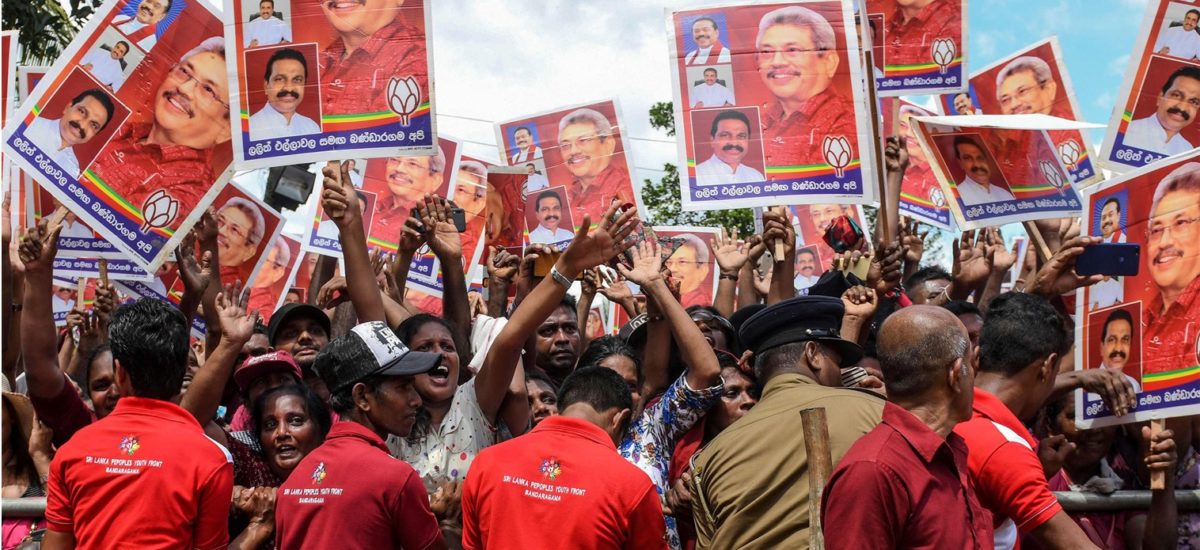Image Courtesy the Financial Times
“Slip slidin’ away, Slip slidin’ away…” Paul Simon
No astrologer in Sri Lanka reached such dizzy heights as Sumanadasa Abeygunawardane. He predicted for the Rajapaksas the future they wanted and was rewarded with power and riches at public expense.
When the ‘royal astrologer’ foretold that the next half century would belong to the Rajapaksas and that Mahinda Rajapaksa, after a fourth and perhaps even a fifth term, will be succeeded by a son or a brother, he was reinterpreting in cosmic terms the reality the Rajapaksas were creating on the ground. The prediction made soon after winning the Eelam War was the first hint of the coming of the 18th Amendment.
The 2015 defeat derailed this dynastic project but didn’t destroy it. The journey resumed with renewed vigour with Gotabaya Rajapaksa’s spectacular victory at the 2019 presidential election. It seemed as if the Rajapaksa dynasty was here to stay for a long time, just as Sumanadasa Abeygunawardane had predicted.
During the run up to the presidential election, Basil Rajapaksa, in semi-jocular vein, referred to older brother Gotabaya as a terminator (of corruption). Terminator seems the most fitting political sobriquet for President Gotabaya. A trail of ruins would be his presidential legacy. The most consequential amongst them may well be the Rajapaksa dynastic project.
President Gotabaya seems to be occupying a Sri Lanka in a parallel universe, a land rapidly moving not towards economic bankruptcy, institutional dysfunction, and social collapse but prosperity and splendour. Brothers Mahinda and Basil would be more in touch with reality, more cognizant of how close to disaster the familial project is. If they have any consolation in these hard times, it would be the chaos in the oppositional space.
Oppositional disarray was one of the logical reasons that made Mahinda Rajapaksa go for an early presidential election in 2014. The potential for a Rajapaksa defeat had been building up slowly, at least from 2011. But it became a reality only after the fractious opposition gathered into a broad anti-Rajapaksa front. This oppositional coalescence provided the stage on which mounting economic woes and dissent within the governing coalition could develop into a massive electoral defeat for the Rajapaksas.
Today Sri Lanka is facing an economic collapse unprecedented in her modern history. Cracks are forming within governing coalition from top to bottom. In the latest in a string of grassroots level defeats, the UNP ousted the SLPP to gain power in the Lahugala Pradesheeya Sabha. At the heights of their unpopularity in late 2014/early 2015, the Rajapaksas were objects of fear. Today they are objects of hate and ridicule.
The situation is propitious. Oppositional unity is the only missing ingredient.
The of 2015-2019: the need for an honest assessment
Mahinda Rajapaksa, unlike brother Gotabaya, is believed to have the pulse of the people. That does not stop him from indulging his outrageous whims in a distastefully insensitive manner, as the recent trip to Tirupathi in a private jet demonstrates.
Had this private jet incident happened during the previous Rajapaksa rule, the story would have had a stillbirth or succumbed to infanticide. Traditional media had been silenced and alternate spaces hemmed in with legal and illegal measures (such as the banning of several websites, including the Colombo Telegraph). The illegal (and thuggish) impeachment of the chief justice and subsequent cooption of the upper judiciary rendered any relief via courts a near impossibility. The Rajapaksas enjoyed total impunity.
Perhaps Mahinda Rajapaksa too occupies a slightly different reality, not a parallel universe, but the past. Perhaps he thought he could junket in a private jet with total impunity because the story would never become public knowledge. But thanks to the vibrancy in the alternate media spaces, the story exploded, forcing the Rajapaksas to scramble for excuses and explanations.
Most of the constitutional and institutional achievements of the Sirisena-Wickremesinghe administration have been rolled back. But the psycho-political ones remain and have expanded. One example suffices. During the first Rajapaksa rule, no cartoonist dared to draw Gotabaya Rajapaksa. When a newspaper made a harmless quip about his wife, the editor was summoned to the CID and the subeditor responsible for the funny caption interdicted. While Defence Secretary Rajapaksa was a no-go zone for humorists, President Rajapaksa has become their daily fare. The Rajapaksa defeat and their years out of power freed minds and stiffened backs. The radical break between 2015 and 2019 is the reason for today’s vibrancy of alternate media, especially social media.
The Rajapaksas’ ham-handed attempts to silence critics are boomeranging. When villagers of Meemure complained to a You Tube channel about officials not implementing promises made by President Gotabaya during his Gama samaga pilisandara (Conversation with Village), the police were sent to question them. That attempt to cow the villagers into silence bloomed into another news story, this time about Rajapaksa intolerance and repression. According to the internet, there is to be a police inquiry about the ‘hooting- incident’ outside the milk powder outlet in Jubilee Post. If the inquiry is actually held, its sole achievement would be to confirm that irate customers queuing for the milk powder queue did hoot at the president.
Most of this vocal expression of dissent, this derisive laughter would have been possible if the 2015-2019 democratic hiatus did not happen,
Recently, President Gotabaya complained that the opposition speaks as if it was never in government. He has a point. The attempt to create a Chinese wall between the opposition of today and the years of 2015-2019 is both unrealistic and unintelligent. Even at its very worst, the Sirisena-Wickremesinghe administration was far better than the Gotabaya-Mahinda-Basil-Namal rule. It would make more sense to come up with an honest assessment of the previous administration, owning its successes, admitting its failures, and explaining what concrete measures would be taken to evade the errors and build on the achievements.
Currently, the Southern opposition is busy turning itself into a ‘circular firing squad’ (a phrase coined by Barack Obama). The reason is its obsession with a presidential election which will not be held until late 2024. No thought is being given to the possibility of using intervening non-national elections to weaken the Rajapaksas regime beyond the point of recovery. After all, the Rajapaksas’ not-so-stellar performance at PC polls provided one of the earliest hints about their growing electoral vulnerability. This was particularly evident in its squeaky victory at the Uva PC poll, thanks to an energetic campaign by Harin Fernando and the UNP. Today’s opposition has a far greater chance of giving the Rajapaksas a serious drubbing in a PC or LG poll, provided its various components can find some common ground. This is impossible so long as various leading figures of the Southern opposition remain obsessed with the presidential election.
The Rajapaksas have lost the floating voter, but their base remains, attached to the ruling family by the glue of Sinhala-Buddhist supremacism and minority-hatred. While the floating voters have abandoned the Rajapaksas, they have not embraced any opposition party in sufficient numbers. A segment may back some oppositional candidate at the next presidential election. Many may abstain, driving down the turnout. A low poll may decide the election in Rajapaksa favour.
Opportunities and dangers
The Gotabaya-Mahinda-Basil-Namal rule has almost unmoored the system. The unthinkable has become normal every day realities. The exceptionality of this regime-failure is creating unprecedented opportunities for transformative change.
Take the presidential system, or rather its quasi-monarchical version that operates here. The disaster that is the Gotabaya presidency is the clearest possible warning of the danger of placing unlimited and untrammelled power in the hands of one individual. Lankan presidential system was created not to fulfil a national need but to satisfy the long held ambitions of one individual. JR Jayewardene’s boast about lacking the power only to effect a sex change was indicative of the hubristic infantilism that would drive him error to crime and back in an unending vicious cycle.
Now is the time to renew the discussion about the presidential system, to initiate a rational dialogue about a system of governance that is suited to national needs rather than to the ambitions and vanities of individual politicians.
Gotabaya Rajapaksa tries to blame all his failures on the pandemic. But the original sin of his regime was his disastrous tax policy. His tax cutting fiesta caused massive erosion in the tax base between 2019 and 2020. For example, replacement of the compulsory PAYE tax with a voluntary APIT system led to a 42.2% decrease in the direct tax base while increasing of the registration threshold for VAT caused a 71.8% decline in the indirect tax base. If the seminal role played by this tax policy in the subsequent disasters is not understood, the necessary corrective measures would not be instituted even by a post-Rajapaksa administration.
Pulling Sri Lanka out of the economic morass of Rajapaksa creation would entail massive burdens, whether we go to the IMF or not. A critical question is how these burdens should be apportioned. Or to put it another way, who would be forced to gulp the bitter core of the pill and who would make off with the sweet coating. This would be determined to a large extent on where and how income increases and cost cutting happen.
For example, how should a post-Rajapaksa administration rebuild the tax base denuded by the Rajapaksas? Should the easy way out be taken, by relying mostly on indirect taxes? Or should a future government address the difficult challenge of creating a more just tax regimen by lessening the extreme imbalance between direct and indirect taxes? In cost cutting where should the axe fall most? If the defence budget is left untouched or allowed to grow, if the mania for showy infrastructure projects (with their potential for huge kickbacks) continues, the cuts will have to come from areas such as education and health etc.
If the already overtaxed low income owners are burdened still further, how will that impact on political stability? If critical social spending is slashed in order to keep the bloated military budget intact, how would that impact on educational and health prospects of future generations?
Martin Luther King once warned about politicians who feed their constituents with “the stale bread of hatred and the spoiled meat of racism”. As a number of recent incidents (from holding the state Wesak festival in Kuragala to the tragicomic affair of the ‘church bomb – the police initially offered a ‘Muslim mastermind’ and are now blaming a retired physician of catholic faith) indicate, the Rajapaksas will rely on the race card to stay in power.
The racist vote is not a canard. These are ordinary Sinhala-Buddhists who do not necessarily gain anything material from Rajapaksa rule. They still remain loyal to the Rajapaksas, because their true aim is a Sri Lanka where the minorities are kept down, literally. They are the Lankan equivalents of Make America Great Again crowd. This constituency is a global phenomenon. They hark back to an imaginary golden past, when the country was made in their own preferred image. This constituency is unhappy with democracy, prefers a strong leader, a king or a Hitler.
This constituency cannot be won over by pandering so Sinhala-Buddhist supremascism. As long as Mahinda Rajapaksa is living, it will stay with the Rajapaksas. Post-Mahinda, this constituency is likely to fracture. Some will stay with the remaining Rajapkasas. The more ideological others will seek extra-racist alternatives. It is from this segment the impulse and drive for coup solutions will emerge.
Just as a post-Rajapaksa future (assuming that the opposition can cease drawing daggers against each other until the Rajapaksas are really gone) presents unprecedented opportunities it also contains equally unprecedented dangers. If the opposition fails to provide a viable alternative to the Rajapaksas before and after polls, it may open the flood gates to a truly elemental force that is more extremist and intolerant than even the Rajapaksas.


